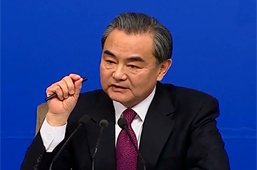
Chinese Navy hospital ship Peace Ark arrives in the Pearl Harbor in Hawaii, the United States, on June 29, 2016. A Chinese fleet with about 1,200 soldiers and officers arrived in the Pearl Harbor Wednesday to take part in the Rim of the Pacific 2016 (RIMPAC 2016) multinational naval exercise. [Photo/Xinhua]
The Pentagon rescinded its invitation on Wednesday for the Chinese navy to join the biennial Rim of the Pacific exercise organized by the US Navy, accusing Beijing of "continued militarization" of the South China Sea.
By excluding China from the world's largest international naval exercise, which the Chinese Navy joined in 2014 and 2016, the Pentagon has reversed course on the cooperative momentum between the two countries' militaries in noncombat areas, thus increasing the chance of a misunderstanding or even miscalculation.
Military-to-military engagement and participation in multilateral exercises can help build trust and goodwill and prevent a crisis from escalating into conflict, which is why Foreign Minister Wang Yi said the decision was "unhelpful".
But the unconstructive move should perhaps come as no surprise, given the United States has changed tack in its approach toward China since the last RIMPAC. The 2018 National Defense Strategy, the first since President Donald Trump took office, singled China out as the "revisionist power" that poses "the central challenge to US prosperity and security".
But it is not China that is responsible for militarizing the South China Sea. Its deployment of limited military facilities and equipment in the South China Sea are of a scale necessary to safeguard its national interests and territorial integrity, and deter any attempts at secession by emboldened and cajoled Taiwan "independence" seekers.
Rather it is the pivot to the Asia-Pacific by the US that is to blame. The current administration has furthered this, using China's evolving defense posture and the territorial disputes it has with some of its neighbors as an excuse to increase its military presence in the region, invite its allies to do the same, and pocket some money from China's neighbors by playing up a "China threat" and then going door to door peddling its outdated weaponry.
However, while the sales pitch has proved enticing — and why not? Everyone likes new toys — the fact remains that it is all smoke and mirrors.
This is a unique period of strategic opportunity for China's development, and it is not in its interests to jeopardize regional peace and stability.
China's neighbors know this, and know that it is also not in their interests to do so. Which is why, despite the hawking by the US, they are negotiating with China on a code of conduct to maintain peace and stability in the South China Sea. The US should change its negative mindset and seek to do the same.



 Overview
Overview Resources & Environment
Resources & Environment



 QQ 好友
QQ 好友 微信好友
微信好友 易信好友
易信好友 QQ空间
QQ空间 朋友圈
朋友圈 百度空间
百度空间